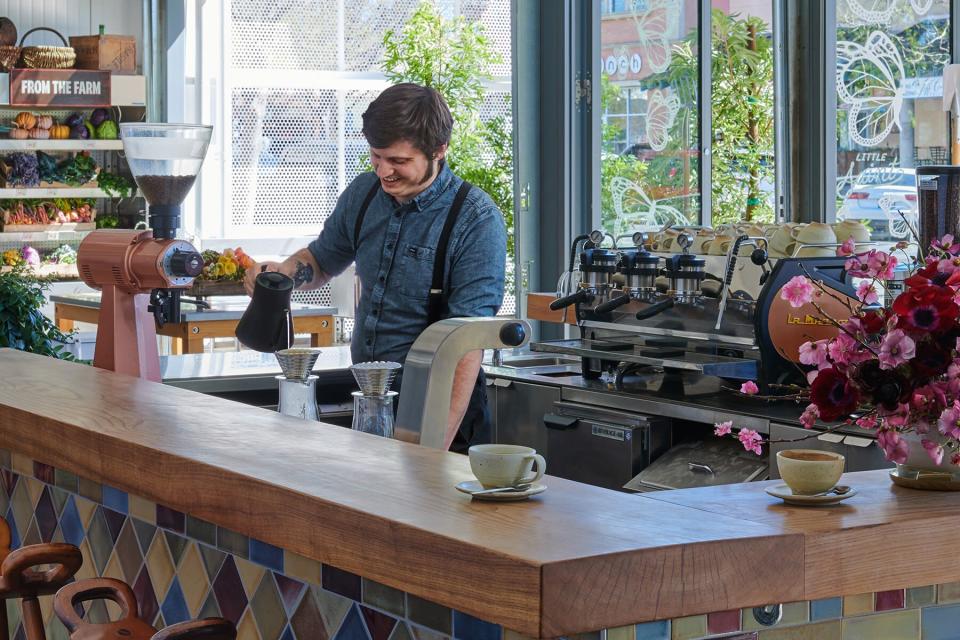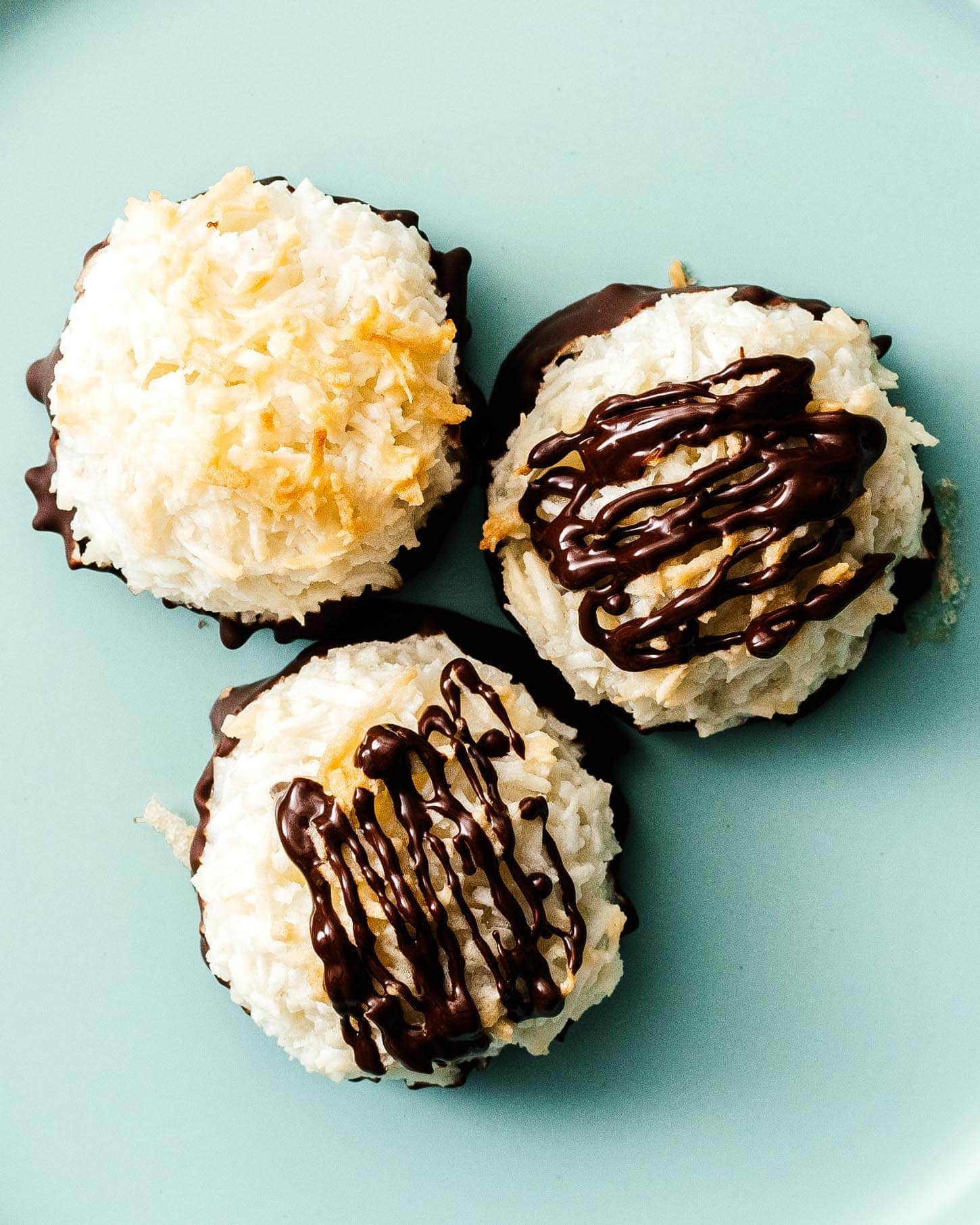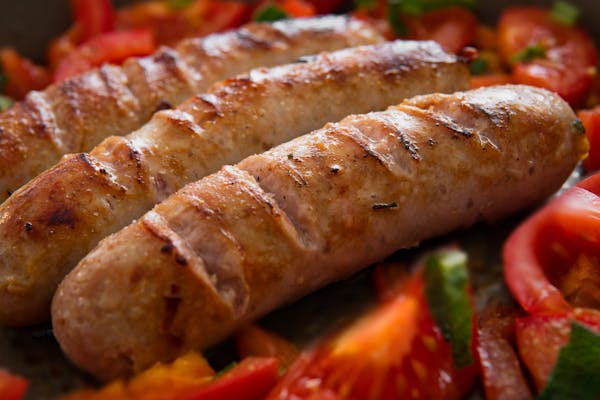
Courtesy of Brendan Mainini
Sonoma County’s long-anticipated Little Saint, a rendezvous spot of virtuous vices, from biodynamic plant-based cuisine to a covetable collection of conscious craft, opened on Earth Day (April 22) in Healdsburg, California.
“I think of Little Saint as purpose-driven. The nourishment you’ll get here won’t just come from the food and drink, but also the art, the music, and all the conversation those things will inspire,” said creative director Ken Fulk, the San Francisco celebrity designer who was tasked with the project’s aesthetic finery and cultural imprint by Little Saint owners Jeff and Laurie Ubben. To helm the farm and food programs, the local activist couple also brought on Kyle and Katina Connaughton of Michelin three-starred SingleThread Farms, also in Healdsburg.

Courtesy of Brendan Mainini
“But there’s no pedestal here. There is a grittier side to Little Saint, which I like to call hard work,” Fulk said. “Dirt under the fingernails. Mud on the boots. Late nights collaborating. Bleary-eyed early mornings on the farm. It’s not a precious endeavor, but trying to make a difference never is.”
In the spiritual mold of Fulk’s other bustling community ventures, Saint Joseph’s Arts Society in San Francisco and Provincetown Arts Society in Massachusetts, Little Saint’s arts program showcases and supports local creatives whose work embodies the land’s essence, or as the designer puts it “the gentleness of Napa and Sonoma.”

Courtesy of Brendan Mainini
On the note of “gentleness” in Sonoma, at Little Saint’s 10,000-square-foot property, visitors will find a richly layered experience that sacrifices no small detail in the name of “doing good and being kind,” Fulk said.
Even the chair upholstery, fashioned from used strips of denim sewn together by hand, is an homage to the rough-and-tumble work of agriculture. Muscular tables of salvaged elm and cypress slabs come from Arborica, a wood-salvage yard near Tomales Bay. The custom handmade tiles by Kelly Farley that clad Little Saint’s coffee shop (with beans from boutique San Francisco roaster, Saint Frank) were installed in a harmoniously random pattern, symbolizing collaboration. Bay Area artist Ben Venom‘s large-scale quilt — a bespoke convergence of punk ethos and Americana craft — will hang in Little Saint’s second-floor lounge, a backdrop for ticketed concerts and lectures. While a percentage of Little Saint’s proceeds will go to the arts foundation, live music will still be free to the public on Thursday nights. Forthcoming Bay Area indie acts include singer-songwriter Madeline Kenney on April 28, folk four-piece Yea-Ming and the Rumours on May 5, and gospelist Meaghan Maples on May 12.

Courtesy of Brendan Mainini
Fulk also hints at future unannounced appearances by Billboard recording artists from his star-spangled client Rolodex. “You’ll have to be there on the right night to catch their shows,” he said. “I want headliners to treat Little Saint like a whistlestop.”
Speaking of idealistic frontiers, farm manager Samantha Gregory cultivates unique plant varietals for the restaurant in the minimal-tillage, eight-acre farm located about four miles from the venue. The practice rebuilds the ecosystem of the formerly depleted soil, boosting its climate resiliency and enhancing crop vitality for dishes like kohlrabi brandade tartine or rosemary spaetzle with sunchoke cream from Little Saint chef de cuisine Bryan Oliver. Meanwhile, cocktails like “What Grows Together,” a spicy margarita that gets its heat from fermented serrano pepper, will give kitchen ingredients a second or third life, according to bar manager Matt Seigel, formerly of Eleven Madison Park.

Courtesy of Brendan Mainini
“You can indulge in amazing food and drink and still feel like you’re engaging in something meaningful,” said Gregory. “Maybe your meal won’t change the world, but at least it’s progress in the right direction.” Making small moves toward greater living resonates deeply with the farmer. In the first installment of Little Saint’s biannual zine From the Farm, Gregory, who identifies as queer, writes about the parallels between agriculture and her coming-out journey. “I feel like I found this true version of myself through working on farms, which gave me grounding and purpose when so many things felt out of my control,” she said.






